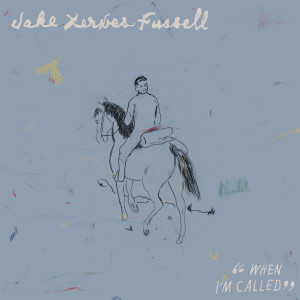 I could make this entire review about one single song on Jake Xerxes Fussell’s fifth album When I’m Called. His treatment of the song “Cuckoo!” perfectly encapsulates the way song-gatherer Fussell creates his art. It started out as a “lieder” or art song, with words by Jane Taylor set to a piece by the English classical composer Benjamin Britten. Who’s Jane Taylor? The author of “Twinkle Twinkle, Little Star.” I didn’t know any of this when the song jumped out at me as I listened to the collection for the first time, I was just drawn to the tune, Jake’s homespun delivery and the delightful lyrics about the first months of a young bird’s life.
I could make this entire review about one single song on Jake Xerxes Fussell’s fifth album When I’m Called. His treatment of the song “Cuckoo!” perfectly encapsulates the way song-gatherer Fussell creates his art. It started out as a “lieder” or art song, with words by Jane Taylor set to a piece by the English classical composer Benjamin Britten. Who’s Jane Taylor? The author of “Twinkle Twinkle, Little Star.” I didn’t know any of this when the song jumped out at me as I listened to the collection for the first time, I was just drawn to the tune, Jake’s homespun delivery and the delightful lyrics about the first months of a young bird’s life.
“In April I’ll open my bill / In May I’ll sing night and day / In June I’ll change my tune / July, far far I’ll fly /
In August, away.”
Common elements of the human condition — the passage of time, mortality, and especially themes of travel and wandering — run through the nine songs on this LP, all delivered in Fussell’s melted-butter baritone. This time out he mostly accompanies himself on an acoustic guitar, but with a similar percussive fingerpicking style that he more often uses on an electric. But his modus operandi remains the same: reworking traditional and folk songs and presenting them in an American style folk and blues setting, often to melodies of his own devising.
There are a couple of exceptions to that method. The first is the opening track “Andy,” writtten in the 1980s by “eclectic multimedia artist” Maestro Gaxiola about his artistic rivalry with Andy Warhol. He keeps the tune but slows it down considerably. The other is the title track “When I’m Called,” which Jake cobbled together in part from a note he found along the road, to which he added a couple of bits from some traditional sources.
By contrast, there are some very old songs here, more than one from field recordings made in the 1960s and ’70s by Jake’s late mentor, folklorist Art Rosenbaum. “Feeing Day” is a gentle, sunny ballad about a fellow who encounters a bonny lass on the road to Glasgow seeking work. I had to look up “feeing time,” which was when British workers would seek positions for the coming year on various farms or estates. Likewise “One Morning In May,” a lilting waltz in which the singer is an observer of an encounter between what appears to be a soldier and a young lady — but the lady may not be what she appears. And rounding out the trio of deeply traditional material is “Who Killed Poor Robin,” which he sets in a steady loping tempo.
On the theme of rambling we have the stately “Leaving Here, Don’t Know Where I’m Going,” set in a folksy A-A-B blues pattern; “Gone To Hilo,” which finds a young lover pining for young Johnny who’s gone away; and the album’s closer “Going To Georgia,” about the fickleness of young men and the certainty of the grave.
Great credit goes to producer James Elkington for his sensitive arrangements — some backing vocals from Robin Holcomb and Joan Shelley, occasional horns and strings, some drums, piano, harmonium here and there, guitar from Blake Mills, and Elkington’s own contributions on a host of instruments. But all of the arrangements keep the focus squarely on Fussell and the songs, which are as warm and comforting as your favorite old flannel shirt.
(Fat Possum, 2024)
